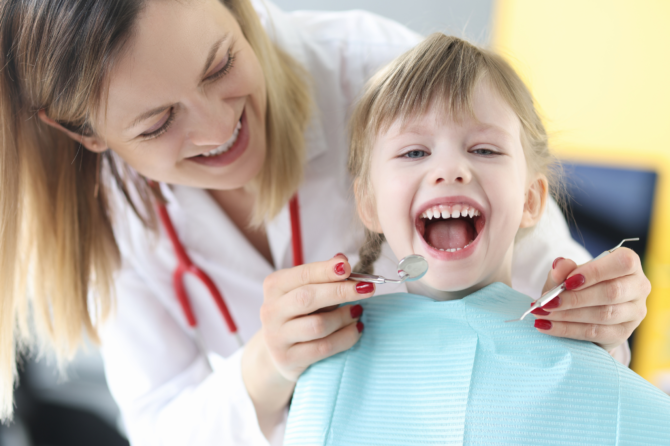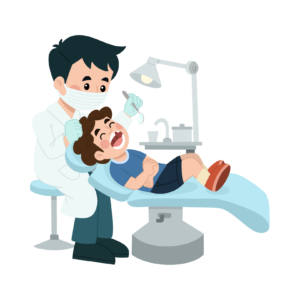
Understanding and Managing Bruxism in Children : Tips For Parents
Teeth grinding, or bruxism, is a common occurrence among children that often leaves parents concerned. Understanding the causes, identifying symptoms, and implementing effective management strategies are crucial aspects of addressing this oral habit.
Bruxism in Children:
Bruxism involves the unintentional grinding, gnashing, or clenching of teeth. This can manifest during sleep (sleep bruxism) or waking hours (awake bruxism). While the exact causes remain elusive, various factors contribute to this habit in children. Stress, anxiety, misaligned teeth, abnormal bite, sleep apnea, and allergies are among the potential triggers.
Signs and Symptoms:
Parents play a crucial role in identifying signs and symptoms of teeth grinding in their children. Observing the following indicators can help in recognizing bruxism early:
- Loud clenching or grinding sounds during sleep.
- Complaints of face, jaw, or headache pain.
- Increased wear on teeth or tooth discomfort.
- Chipped, worn-down, or flattened tooth surfaces.
- Complaints of exhaustion or irregular sleeping habits.
- Tenderness or soreness in the jaw muscles.
After Effects:
Understanding the potential complications of bruxism is essential for parents to appreciate the importance of addressing this habit. Consistent teeth grinding can lead to the following issues:
- Dental damage: Excessive grinding can wear down tooth enamel, causing fractures, chips, or sensitivity in the teeth.
- Jaw pain and dysfunction: Prolonged bruxism might result in jaw muscle pain, temporomandibular joint (TMJ) issues, or limited jaw mobility.
- Sleep disturbances: Bruxism can disrupt sleep patterns, leading to restless evenings and weariness throughout the day.
- Behavioral and emotional effects: Due to the discomfort caused by bruxism, some children may become more stressed, anxious, or irritable.
Bruxism Management and Treatment:
Effective management of bruxism involves a multifaceted approach, empowering parents to address the root causes and mitigate its effects. Here are practical steps parents can take:
 Consult with a pediatric dentist:
Consult with a pediatric dentist:
Schedule an appointment with a pediatric dentist if you suspect your child is clenching or grinding their teeth. A professional evaluation can determine the severity of the bruxism and identify any dental conditions that may be contributing to it.
Address stress and anxiety:
Help your child cope with tension or worry by engaging in open communication. Use relaxation methods, such as guided imagery or progressive muscle relaxation, and incorporate calming activities into their daily routine. Establishing a relaxing nighttime ritual, such as reading or gentle stretching, can contribute to quality sleep.
Establish a consistent sleep pattern:
Ensure that your child gets adequate sleep and follows a regular sleep schedule. Prioritize rest, as fatigue can be a contributing factor to bruxism. Consistency in sleep patterns helps regulate your child’s circadian rhythm, promoting better overall health.
Limit stimulating substances:
Keep caffeine-containing meals and drinks away from your child, especially in the hours leading up to bedtime. Caffeine can make muscles more tense and potentially worsen bruxism.
Dental interventions:
Depending on the severity of bruxism, the pediatric dentist may recommend dental interventions. Custom-fitted nightguards or mouthguards can protect the teeth and reduce grinding forces. Additionally, orthodontic treatments may be considered if contributory factors like misaligned teeth or an abnormal bite exist.
Promote relaxation techniques:
Teach your child relaxation techniques before bedtime to ease tension in the jaw muscles. Deep breathing exercises, soft jaw stretches, and mindfulness activities can be effective in promoting relaxation and reducing the likelihood of bruxism.
Consistent follow-ups:
Maintain regular communication with the pediatric dentist to monitor your child’s development. Routine dental check-ups allow the dentist to detect changes in tooth wear, bite alignment, or general oral health.
While teeth grinding in children may initially be a cause for concern, armed with knowledge about its possible causes and complications, parents can take proactive steps to address the issue. By tackling stress, promoting relaxation, ensuring a consistent sleep pattern, limiting stimulating substances, considering dental interventions, and maintaining regular dental check-ups, parents can contribute significantly to their child’s oral health and overall well-being.
If you’re a parent seeking guidance on your child’s teeth grinding, reach out to a experienced pediatric dentist in Dubai. They can provide valuable advice, conduct thorough assessments, and offer personalized solutions to ensure your child grows up with excellent oral healthcare habits.
Leave a reply
Leave a reply